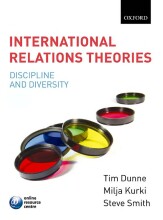Summary: Foundations Of Comparative Politics | 9781316552902 | Kenneth Newton, et al
- This + 400k other summaries
- A unique study and practice tool
- Never study anything twice again
- Get the grades you hope for
- 100% sure, 100% understanding
Read the summary and the most important questions on Foundations of Comparative Politics | 9781316552902 | Kenneth Newton; Jan W. van Deth
-
1 Governance: Defining National and European Governance
-
1.1.1 Lecture 1A
This is a preview. There are 7 more flashcards available for chapter 1.1.1
Show more cards here -
What is a state, according to Max Weber?
A compulsory political organization with continuous operations will be called a 'state' insofar as its administrative staff successfully upholds the claim to the monopoly of the legitimate use of physical force in the enforcement of its order. -
What are the three conventional characteristics of a state?
- A territory that it considers its own;
- A people with a common consciousness and identity;
- Sovereignty
- Legitimate: people follow the legitimate government within that territory;
- Government;
- The monopoly of force: the government is the only legitimate actor to use force.
-
What different arguments are there to classify states?
- The rational argument;
- The economic argument;
- The individual argument;
- The 'End of History' argument.
- The rational argument;
-
In classifying states, what does the rational argument entail?
The rational argument to classify a state entails the state capacity and capability of states, for example it uses the Fragile State Index. -
In classifying states, what does the economic argument entail?
The economic argument to classify a state entails the comparing of Gross Domestic Product (GDP) of states. -
In classifying states, what does the individual argument entail?
The individual argument to classify a state entails the comparing on the Human Development Index (HDI) by comparing factors of social and societal life and 'quality of life'. -
In classifying states, what does the 'End of History' argument entail?
The 'End of History' argument to classify a state entails the comparing of liberal democracies and freedom. The ultimate goal would be to achieve liberal democracy and thus 'freedom' in order to be on the "good" side. -
What elements can be seen as the start of modern states?
- War and organization -> security systems, tax systems, etc.
- the Treaty of Westphalia (1648) -> Mercantilism & sovereignty
- American and French revolutions -> citizens now became a central object in the picture for the first time
- Industrialization -> redistribution of wealth and welfare state & urbanization: changing structure of society from farming to urban areas.
- War and organization -> security systems, tax systems, etc.
-
What does Mercantilism (which was installed after the Treaty of Westphalia) entail?
Mercantilism is an economic system that promotes governmental regulation of a nation's economy for the purpose of increasing state power at the expense of rival national power. The people profited from this and nations tried to accumulate the largest share of wealth by maximizing exports and limiting imports via tariffs. -
What were the two main components of efficiency that worked in the process of government to governance?
The two main components of efficiency were:- Industrial evolution
- Firms enter the picture;
- New technological inventions;
- Companies become part of the ruling.
- Production becomes more flexible
- Firms can decide on general economic and trade rules due to competition within the market
- Methods of trading evolve and the trade market grows substantially.
- Globalization
- Higher grades + faster learning
- Never study anything twice
- 100% sure, 100% understanding
































